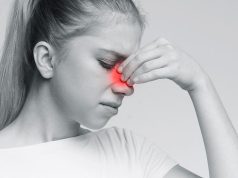For patients with refractory chronic rhinosinusitis, productivity remains stable with medical therapy
FRIDAY, Oct. 30, 2015 (HealthDay News) — For patients with refractory chronic rhinosinusitis (CRS), continued medical therapy is associated with maintenance of productivity outcomes, according to a study published online Oct. 29 in JAMA Otolaryngology-Head & Neck Surgery.
Luke Rudmik, M.D., from the University of Calgary in Canada, and colleagues conducted an observational cohort study involving 38 patients with a guideline-based diagnosis of CRS whose initial appropriate medical therapy failed. The authors examined the change in productivity costs for patients who selected to continue medical therapy.
The researchers found that the mean baseline annual productivity cost was $3,464 per patient. After a mean of 12.8 months of continued medical therapy, productivity costs were $2,730 (before versus after continued medical therapy productivity cost, P = 0.74). There was a reduction in mean annual absenteeism from five to two days (P = 0.02). Mean annual presenteeism and mean annual household days lost were maintained at baseline levels (P = 0.93 and 0.51, respectively). No significant differences were seen in productivity outcomes based on endoscopy, the 22-item Sinonasal Outcome Test score, age, or polyp status (all P ≥ 0.11).
“Outcomes from this study suggest that productivity in patients with refractory CRS who have minor reductions in baseline productivity can remain stable with continued medical therapy,” the authors write. “Physicians can use this information to inform appropriate patients with CRS of their expected outcomes from continued medical therapy.”
Several author disclosed financial ties to the medical device and technology industries.
Copyright © 2015 HealthDay. All rights reserved.








